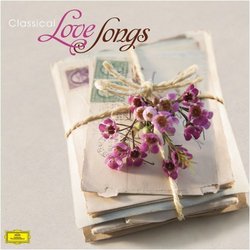Better than it looks!
Ralph Moore | Bishop's Stortford, UK | 03/29/2009
(4 out of 5 stars)
"There is an automatic temptation amongst supposed cognoscenti to be snooty about operatic compilations aimed at the general market, yet I have just encountered two which have given me real pleasure: this one and the new Delos "Opera Gala". It was clearly devised with Valentine's Day in mind, opening up possibilities of delicious irony for those of us of a satirical frame of mind, as if you are actually familiar with the operas from which these "bleeding chunks" have been excised, you will realise that most of these "love songs" are either sung by characters who are liars, cheats or unfaithful (Carmen, the Duke from "Rigoletto", Dalila and Don Giovanni) or in a situation involving betrayal or supposed deceit ("The Marriage of Figaro", "Rigoletto" - again - "Turandot", "Madama Butterfly" and "Luisa Miller"). Let that pass; what you have here is a procession of gorgeous tunes sung by a selection of the finest voices to record for Deutsche Grammophon in the last forty-five years, ranging from Fritz Wunderlich's incomparably plangent Tamino in 1964 to the most recent recordings by Rolando Villazon and Anna Netrebko.
Given the romantic bent of the disc, there is inevitably a preponderance of tenors; no fewer than nine, in fact. Then we have six sopranos, four mezzos and a couple of baritones - hardly a bass in sight, unless you count Thomas Quasthoff's bass-baritone in a delightfully unpretentious account of that perennial favourite "Là ci darem la mano" with Anna Netrebko. Clearly basses are too sombre to be permitted a look in here - yet I think the most genuine and moving love song in the entire operatic canon is either Gremin's paean to Tatiana from "Eugene Onegin" or the baritone Yeletsky's "Ya vas lublu" from "Pique Dame", both by Tchaikovsky, who is notably absent from this disc.
Inevitably in such an enterprise, a reviewer is going to disagree with some of the choices: given my complaint about the dearth of lower male voices, I cannot reasonably object to DG having included Bryn Terfel's "Plaisir d'amour", but I keep expecting him to break out into Wotan as he struggles to keep his outsize voice and personality under control while trilling that pretty little ditty. The dialogue preceding the big duet from "West Side Story" jars; not least because it highlights the absurd mismatch between the actors' voices and those of Kiri Te Kanawa and Carreras - but they sing so nicely and this is the most authentic love song on the entire album. I was underwhelmed by Garanca's Dalila: flawed French, a not especially refulgent tone and a lack of punch in the lower register - but pleasant enough, I suppose; only lacking in comparison with Callas, Borodina or Rita Gorr. Finally, I could live without the cheesy, would-be trendy verse by David Butchart which intersperses the playlist in the booklet and would, as ever, have preferred a libretto or at least synopses to alert the uninitiated as to what is actually going on - although given my wry observations above about the appropriateness of some items, perhaps that's just as well.
Otherwise, there is so much to revel in here. Despite the opening "Nessun dorma" not being the version by Pavarotti that everyone knows, it is in fact meltingly sung by Domingo in finest heroic voice - even to the point of delivering a proper culminating top B - which he wisely decides not to hold too long. Placido also gives us a rousing "Dein is mein ganzes Herz". It is good to hear Jonas Kaufmann in one of his best roles, in Don José's "Flower Song", and Pavarotti's sole contribution, his 1990 "Una furtiva lagrima", is barely inferior to his earlier classic account. Given his recent vocal difficulties, it is particularly gratifying to hear Rolando Villazon in such electric voice in two Verdi items. There is real tenderness and passion in his searing account of Ropdolfo's wounded reminiscence "Quando le sere al placido".
Netrebko is clearly the star soprano attraction here; in addition to the Mozart duet, she is accompanied by a tenorino in an extended excerpt from "La Traviata" - and very impressive she is, too, delicate and nimble up to a pure top D. She sounds a lot like another great artist, Mirella Freni, who, like Pavarotti, is almost the equal of her younger self (on Decca) in her "Madama Butterfly" aria. The mezzo-sopranos are a starry bunch although Marilyn Horne's formidable Carmen borders on the scary; it would be a braver man than I who ignored her vulgar yell of "prends garde à toi". Then Kozena's sweet Susanna and Bartoli's soulful Cherubino bring consolation. A suitable conclusion is provided in the form of the magical Offenbach "Barcarolle", caressingly crooned by Claudia Eder and Edita Gruberova.
In short, a very well filled disc which would make a lovely gift to one you love, as long as he/she is an opera-loving innamorato but still gives pleasure in its own right as a survey of fine singing in favourite items.
"


 Track Listings (17) - Disc #1
Track Listings (17) - Disc #1